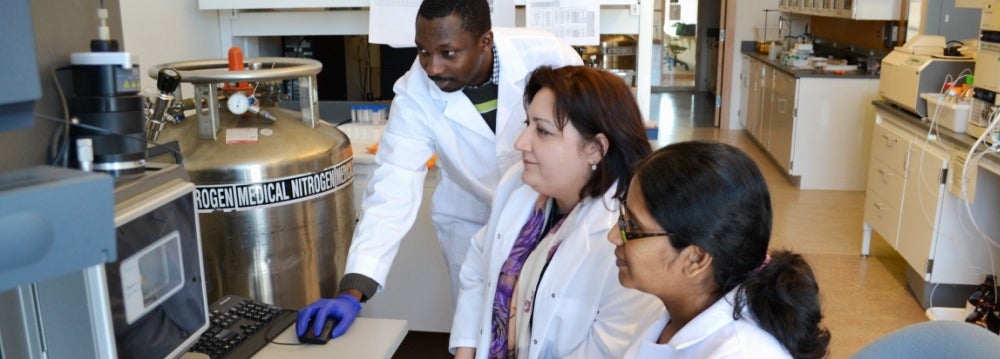< Previous Article | Next Article >
 Dr. Akhlaghi Wins $1.65 Million Grant to Study Possible Alcoholism Treatment
Dr. Akhlaghi Wins $1.65 Million Grant to Study Possible Alcoholism Treatment
Dr. Fatemeh Akhlaghi, a University of Rhode Island professor of biomedical and pharmaceutical sciences, has received $1.65 million from the National Institutes of Health to study a new treatment for alcoholism in collaboration with Dr. Lorenzo Leggio of the National Institute on Alcohol Abuse and Alcoholism.
Awarded to Dr. Fatemeh Akhlaghi, URI professor of biomedical and pharmaceutical sciences, the grant formalizes a partnership with Dr. Lorenzo Leggio, chief of section on clinical psychoneuroendocrinology and neuropsychopharmacology at the National Institute on Alcohol Abuse and Alcoholism and the National Institute on Drug Abuse in Bethesda, Md. The partnership includes Pfizer, the world’s largest research-based pharmaceutical company.
Akhlaghi’s group is one of nine teams in the United States to win such an award. Her collaborative pilot initiative, called “Discovering New Therapeutic Uses for Existing Molecules,” is led by the National Center for Advancing Translational Sciences and funded by the NIH Common Fund. The two scientists are working with an undisclosed compound provided by Pfizer, which has been used to treat Type II diabetes.
A central target of their research is ghrelin, an aminoacid peptide that stimulates appetite and food intake. In those with alcoholism, higher ghrelin concentrations are associated with higher alcohol craving and consumption, according to the researchers. An oral medication that targets the activity of ghrelin and can pass through the blood-brain barrier holds promise for treatment, according to their grant proposal.
If we can stop food cravings, then maybe we can stop alcohol cravings.
“Simply put, URI is helping NIH develop a new treatment for alcoholism,” said Akhlaghi, whose previous work has focused on diabetes and anti-rejection drugs taken by transplant patients. Her expertise is in the area of drug development.
Akhlaghi has been working with Leggio since he was a researcher at Brown University. In 2012, the two collaborated on the grant application under the NIH’s drug repurposing program, which awarded a total of $12.7 nationally in 2013.
Leggio sought out Akhlagi for this latest project because of her expertise in pharmacokinetics, which studies a medicine’s effects on the body, and pharmacodynamics, which focuses on how the biological processes in the body affect medication.
The two are following up on Leggio’s study at Brown, during which he infused study subjects with ghrelin. In each case, alcohol craving went up. They are studying the timing of the drug’s effect and its concentration, its safety in combination with alcohol and early signs of efficacy.

